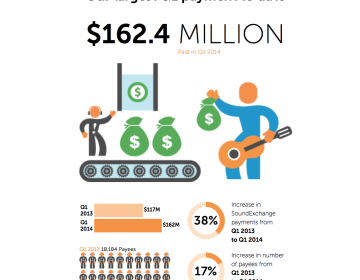Geo Tracking Identifier: Cleaning Up The Nightclub Performance Royalty System

While many of the music industry headlines of late have revolved around heavyweight business partnerships (here’s looking at you, Beats, Billboard, Apple, Twitter, and Shazam), the ever-important subjects of copyright, licensing, royalties, and the companies trying to better those sectors shouldn’t be left on the back burner.
The rise of companies like TuneSat and SongLily, and endeavors like MusicMark, do help keep these kinds of discussions alive and well. However, with music usage incorporated into so many different mediums and activities, efficient uniformity for tracking and proper payout remains a taxing effort for the industry. Tracking “performances” of tracks in nightclubs is a growing issue that has been difficult to tackle, especially where play retention and accuracy is concerned. In Germany, a country known for its widespread clubbing culture, matters concerning copyright, licensing, and payment are controversially handled by the national PRO, GEMA. GEMA’s relationship with the German nightlife scene is currently tense around changing regulations surrounding payment for performances.

GEMA’s strict publishing rights prevent YouTube plays of major content.
Now there is a system currently in testing that may prove to be the next step in smoothing over music usage in clubs—and what better place to take that effort than in one of the world’s capitals of nightlife, and most tightly written royalty and licensing regulations?
Geo Tracking Identifier, or GTI, is a new project based in Germany nurtured by the music tech firm Future Audio Workshop. The current procedures and processes upheld by GEMA for cataloging much of the song play in nightclubs often leaves songs misidentified or unintentionally unnoticed because of the less direct routes by which GEMA analyzes meta and play data of the music that makes it into club rotation. This results in lost payments for artists and lessened confidence in the overall system, which is no good for a PRO already under the lens of public scrutiny and disapproval for highly conservative stances toward ‘the free and accessible.’ The aim of GTI is to strengthen the connection between nightclubs and PRO priorities so the current state of affairs with analysis and payment becomes less problematic.
Hardware testing at Berlin HQ… pic.twitter.com/a5hJJgErQt
— Geo Track Identifier (@GeoTrackID) May 26, 2014
There are four major components to GTI’s processes:
Hardware Interface: An inconspicuous and cost-effective box is installed in a new club and continuously analyzes the music played within the venue. Going from there, data is sent to other segments of the GTI system running in the cloud.
Fingerprinting: After receiving the play data from the box interface, GTI’s system creates and utilizes its own audio fingerprint of the music being played. The fingerprinting system for GTI is designed and calibrated to contend specifically with music that gets melodically modulated, as is often the case with DJ sets.
Matching & Identification: Next in the process, GTI combs through a wide assortment of cataloged tracks, across many genres, to match the new fingerprint. At present, the system on average successfully identifies more than 90% of the tracks that get fingerprinted and the success rate is continuing to grow.
Analysis and Reports: Last but definitely not least, the information GTI acquires is placed in an encrypted database and kept securely away from public access. Here is where PRO’s like GEMA are able to then more accurately distribute the appropriately accumulated fees to the respective artists in question.

Berlin’s Prince Charles nightclub.
Right now, the main trial of GTI is being conducted at the popular Prince Charles club in Berlin.
Already boasting a success rate of nearly 100% certainly bodes well for initial confidence in GTI’s methods, and if it survives and takes hold in Germany, the potential for a “detangling movement” with music ID confusion amidst the US’s own club scene might be on the horizon in the near future. Any step that effectively condenses another piece of the heavily segmented license and compensation junction is progress for the music business as a whole, even if it takes a while to become a national or even global trend.
GTI is currently looking to engage with anyone interested in learning more about or using its system. The company team can be contacted for these purposes directly on their official website under “Contact Us.”
You can also follow GTI on Twitter @geotrackid.
Kira is an old school music nerd with a love for all things creative; always searching for music’s common ground. She graduated with an M.A. in Performing Arts Administration from New York University. Drop her a tweet @shadowmelody1.


![[Interview] Emanuel Heinstein, CEO/Founder of Syncofy](http://www.soundctrl.com/wp-content/uploads/2014/02/BgIsYbACQAAFrFw.png)



